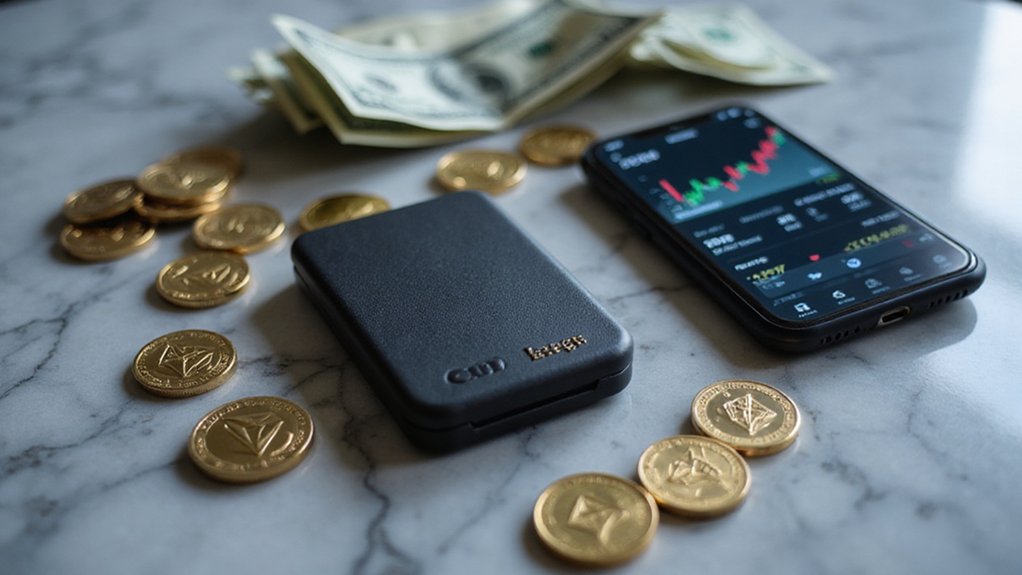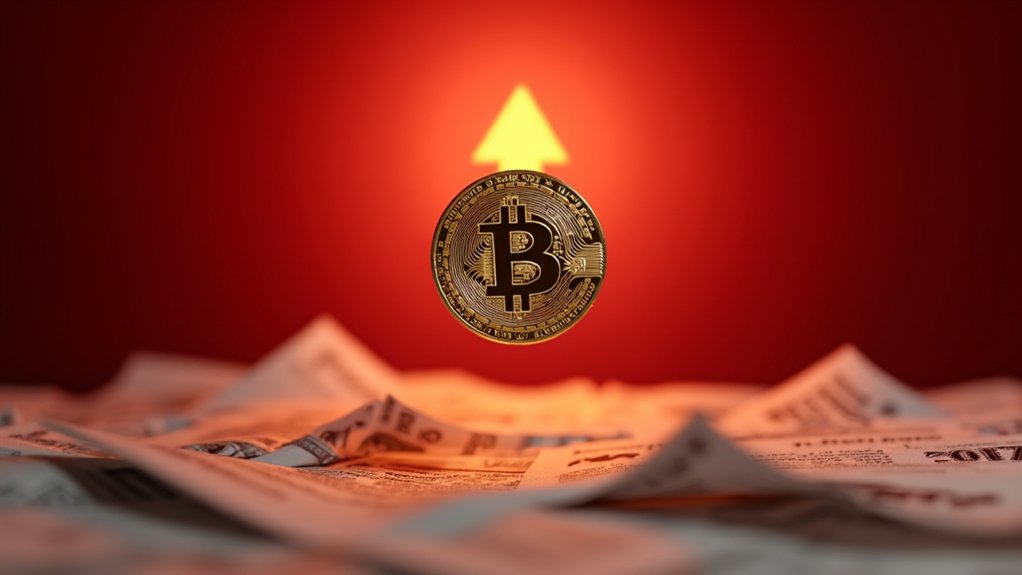Free cryptocurrency distributions—ranging from airdrops to educational rewards—function as sophisticated user acquisition strategies where projects sacrifice immediate value for network effects. While legitimate platforms offer tokens through staking, referrals, or learning modules, participants face tax obligations (free crypto counts as taxable income), phishing risks, and the sobering reality that microscopic faucet rewards barely cover transaction fees. Smart verification through reputable sources becomes essential, though the underlying economics suggest these marketing experiments reveal deeper truths about digital asset valuations.

Why would anyone give away valuable cryptocurrency for nothing? The answer reveals the peculiar economics of digital assets, where distribution strategies often mirror Silicon Valley’s growth-at-all-costs mentality rather than traditional monetary policy.
Crypto giveaways and airdrops represent the most visible manifestation of this phenomenon, serving as marketing mechanisms for new projects desperate to achieve network effects.
These distributions range from legitimate governance tokens—granting holders voting rights in decentralized protocols—to worthless tokens masquerading as the next Bitcoin.
The distinction matters considerably more than promotional materials suggest.
Faucets offer another avenue, dispensing microscopic cryptocurrency amounts in exchange for completing mundane tasks or solving captchas. While the rewards barely cover transaction fees (assuming the tokens possess any value), these platforms persist as entry points for newcomers exploring the crypto ecosystem’s bewildering complexity.
Staking presents a more sophisticated approach, rewarding users for holding tokens and supporting blockchain networks.
Staking rewards token holders for network participation, though required capital investment makes it less free than promotional claims suggest.
Unlike other free crypto methods, staking requires initial capital investment, making it less “free” than advertised.
Mining follows similar logic, demanding substantial hardware investments while promising theoretical profits through transaction validation.
Referral programs proliferate across exchanges like Binance and Coinbase, offering modest bonuses for recruiting new users. These incentives reflect platforms’ user acquisition costs—often exceeding the promotional rewards by substantial margins. Before participating in any referral program, investors should carefully evaluate the platform’s security features and reputation to ensure their funds remain protected.
However, the risks accompanying free crypto often outweigh potential benefits. Scammers exploit human psychology, creating fraudulent airdrops requesting private keys or personal information. The irony proves delicious: people seeking free money frequently lose existing funds to sophisticated phishing schemes.
Tax implications add another layer of complexity. Most jurisdictions classify free cryptocurrency as taxable income at fair market value upon receipt, creating paperwork obligations that dwarf the tokens’ actual worth. Subsequently selling these assets triggers capital gains reporting requirements.
Educational platforms represent perhaps the most legitimate source of free crypto, distributing tokens after users complete learning modules. These distributions often involve the thousands of cryptocurrencies that exist in the market today, ranging from established payment tokens to utility tokens with specific platform purposes. Many recipients discover that these free tokens include stablecoins designed to maintain price stability against major fiat currencies. This approach aligns incentives properly—rewarding knowledge acquisition rather than mere speculation.
Smart participants verify offers through reputable sources, employ secure wallets, and maintain detailed records. The fundamental truth remains unchanged: in cryptocurrency markets, as elsewhere, nothing truly valuable comes without cost.
Frequently Asked Questions
Is Free Crypto Taxable Income in My Country?
The taxation of freely acquired cryptocurrency depends entirely on one’s jurisdiction—a reality that renders blanket statements rather useless.
In the United States, such windfalls constitute taxable income at fair market value upon receipt, with subsequent disposals triggering capital gains obligations.
Other nations maintain divergent approaches, ranging from complete exemption to aggressive taxation schemes.
Taxpayers must consult their specific tax authority’s guidance, as assumptions about crypto’s tax-free nature often prove expensively misguided.
How Do I Safely Store Free Cryptocurrency I Receive?
Storing free cryptocurrency follows identical security protocols as purchased assets—the blockchain remains blissfully indifferent to acquisition costs.
Hardware wallets provide ideal offline storage, while paper wallets offer budget-conscious alternatives.
Users should immediately transfer tokens from exchange platforms (where “free” often becomes expensive through hacking losses) to cold storage, maintaining multiple backup copies of recovery phrases in separate physical locations.
The irony? Protecting worthless airdrops with institutional-grade security measures.
What Are the Risks of Providing Personal Information for Free Crypto?
Providing personal information for free cryptocurrency exposes individuals to identity theft, data breaches, and sophisticated impersonation schemes.
Scammers exploit urgency tactics, creating artificial scarcity to pressure hasty decisions without proper verification.
The pseudonymous nature of cryptocurrency offers little protection once personal details link wallet addresses to identities.
Hardware breaches (like Ledger’s 2020 incident) demonstrate how legitimate platforms become attack vectors, making discretion paramount when evaluating supposedly legitimate giveaways.
Can Free Crypto Offers Be Scams or Fraudulent Schemes?
Free crypto offers frequently operate as sophisticated fraudulent schemes, with scammers deploying impersonation tactics, phishing websites, and fabricated withdrawal barriers to extract real money from victims.
These schemes—responsible for billions in annual losses—typically require upfront fees or additional deposits to access supposedly free tokens, creating the delicious irony that “free” cryptocurrency costs money.
The prevalence of such scams underscores the necessity of verifying authenticity through official channels before engagement.
Do I Need to Verify My Identity to Claim Free Cryptocurrency?
Most reputable platforms require thorough KYC verification—including government-issued identification, proof of address, and sometimes biometric confirmation—before users can claim free cryptocurrency.
However, certain exchanges operate without identity requirements, though these typically offer smaller rewards and face increased regulatory scrutiny.
The verification paradox persists: legitimate platforms demand extensive documentation for modest free crypto, while no-KYC alternatives (as previously discussed regarding fraudulent schemes) often prove questionable at best.









